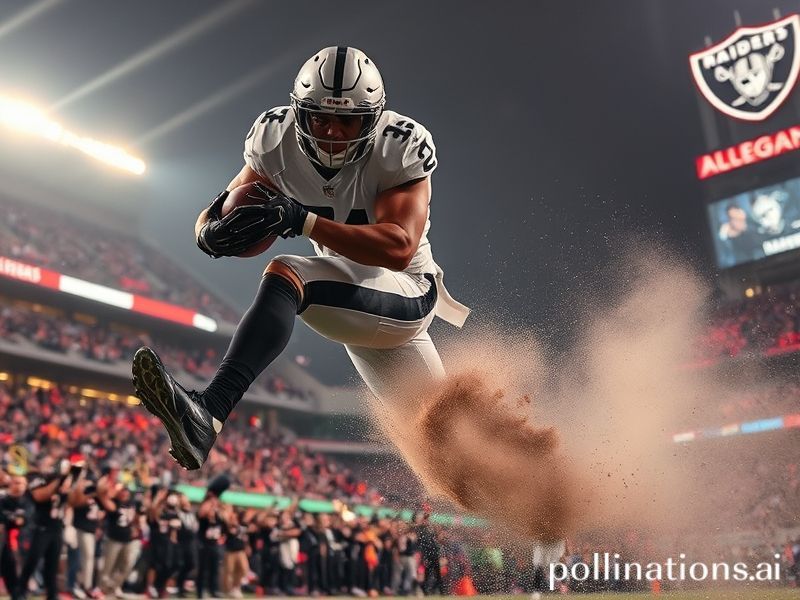Sin City Sin-Eaters: How the Raiders Became Football’s Global Refugee Franchise
The Las Vegas Raiders: America’s Wandering Sin-Eater
By Dave’s Locker International Desk
For the third time in sixty-five years, the Oakland-turned-Los-Angeles-turned-Oakland-again Raiders have folded their tents, slipped the local bonds of affection, and set up shop in Las Vegas—a city whose civic motto might as well be “Your moral bankruptcy, now with comped drinks.” The relocation, finalized in 2020 but only now achieving the full bloom of pandemic-delayed absurdity, is less a sports story than a geopolitical parable: what happens when the world’s most indulgent superpower decides its working-class nostalgia is best monetized by a desert mirage.
Globally, the Raiders’ move lands somewhere between the British Museum’s acquisition policies and the Vatican’s relocation of pedophile priests: an imperial power quietly exporting its least convenient artifacts to a jurisdiction more relaxed about collateral damage. Only here, the artifacts wear eye-black and the damage is measured in municipal bonds. Nevada coughed up $750 million in public money—roughly the GDP of Samoa—to welcome a franchise valued at just over $6 billion, owned by a family whose fortune began with a grumpy patriarch who hated taxes almost as much as he loved winning. Somewhere in the Hague, a war-crimes lawyer is furiously scribbling footnotes.
From Singapore to São Paulo, the transaction reads like a case study in late-capitalist sleight-of-hand. Imagine Real Madrid announcing they’re off to Dubai because the Bernabéu’s bathrooms lack bidets. Picture Manchester United relocating to a floating tax haven in the Irish Sea, rebranding as the “Isle of Man Red Devils—Now With Blackjack.” The NFL’s genius, and its curse, is that it can perform such stunts while still convincing Middle America that Sunday afternoons are about community, grit, and the sacred bond between a rusting city and the guys who knock each other’s brains out for its entertainment.
Overseas viewers don’t even blink. Europeans long ago accepted that loyalty is a marketing term, like “artisanal” or “sustainable.” When the Raiders became the Las Vegas Raiders, a Berlin hipster merely shrugged: “First they took the Sonics, then they took the Chargers, now they’re taking the darkness. It’s all just content.” In Lagos traffic, a driver streams the game on 4G, watches a franchise older than his nation play in a stadium whose retractable roof resembles a Roomba designed by Darth Vader, and thinks, “So this is what the Americans do with their oil money.”
The stadium itself—Allegiant, named for an airline whose business model is charging extra for existential dread—squats on the Strip like a landed UFO made of credit-card debt. Inside, the jumbotron is larger than most EU member states. The crowd is a UN of bro tanks, vape pens, and crypto wallets. The average ticket price could vaccinate a village in Malawi, but at least the nachos come in a souvenir helmet. Between downs, DJs blast EDM remixes of pirate shanties, because nothing says “swashbuckling rebellion” quite like synchronized LED wristbands.
And yet, cynicism has its limits. Somewhere in the nosebleeds sits a welder from Fresno who saved three years for this, convinced that the Raiders’ outlaw brand still means something. He doesn’t realize the franchise’s last true outlaw died in 2011, and even Al Davis had a law degree. Still, the man wears his Howie Long jersey like a passport to an America that used to punch first and litigate later. The Raiders, peripatetic as ever, have become the league’s sin-eater: absorbing the bad karma of relocations, gambling partnerships, and Jon Gruden’s inbox, so other teams can pretend they’re still rooted in something besides quarterly earnings.
The broader significance? In a world where borders shift like crypto prices and loyalties expire faster than green cards, the Raiders are merely ahead of schedule. They are the NFL’s refugee franchise, forever fleeing the wreckage of their own mythology, carrying the black-and-silver flag from one promised land to the next, trading on nostalgia like a futures contract they never intend to deliver. Someday—perhaps when Vegas itself sinks beneath the rising tides—the Raiders will move again, to Mars or Manila or an orbiting Jeff Bezos habitat. And somewhere, a new generation will convince itself that this time, the pirate ship has finally come home.







